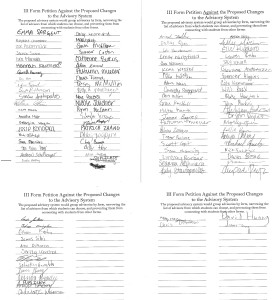May 1, 2015
Dear Dr. Dinkins, Dr. Locke and Reverend Squire,
We are writing to express our concern over the proposed change to our current advisory system, which is indisputably an essential part of the fabric of our school. As a student, there are many obvious benefits to having an advisor, all of which were no doubt taken into consideration when our system was first established.
As stated in Mark F. Goldberg’s How to Design an Advisory System for a Secondary School,
“What’s important is that an advisory system guarantees certain benefits to students in a secondary school:
-Each student is known well by one staff member.
-The staff member receives all important information on the student.
-The staff member knows the student’s parents or guardians.
-Each student has one advocate in the school.
No student can get lost because [he/she] is quiet, or he doesn’t stand out in any obvious way—or because no particular adult thinks having a strong relationship with a student is [his/her] responsibility.”
Currently, we feel strongly that our system does an exceptional job of fulfilling all four of these requirements for a beneficial advisory system. Of course, we are open to improvements to the system, and we understand that there are always more efficient ways to run things, with the caveat that our freedom of choice is not altered. The new proposed system, to group advisories based on forms, seems like a good idea on the surface. However, when examined more thoroughly, it becomes clear that if this system were to be implemented, the criteria for a successful advisory system would not be met, because there would no longer be the critical element of student choice to ensure that an appropriate advocate is selected.
Insisting that students pick their advisors based on which advisors are assigned to their form effectively limits the students’ choice to 25% of the possible advisors, a random 25%, which leaves a 75% chance that the student will not be able to pick his or her top-choice advisor. Additionally, if three quarters of the potential advisors are no longer available to any given student, there is a significant chance that the more reserved or shy students will be unable to find a single advisor in the remaining 25% that with whom they connect on any level. The student-advisor bond is an important one, because it determines how well an advisor is able to advocate for their advisee, and because a student likely would not feel able to come to their advisor about sensitive issues if they did not connect with their advisor. True, students do not always use the advisory system to its full potential, and some choose their advisor solely so that they might be in the same advisory as their friends, but the vast majority use this system to its full potential, and choose their advisor based on who they believe can be a true mentor to them. It is possible that some would be content within the proposed new system, and could form healthy, constructive relationships with their advisors. Many more would not; if not permitted to choose the advisor they felt would be a mentor to them, many would react by either continuing to go to their mentor figure for important advice and advising, consequentially undermining their actual advisor, or by remaining silent, with no faculty member in an officially significant position in their lives from whom they could receive advice.
Furthermore, the proposed advisory system underestimates the importance of inter-form relationships. Currently, there are abundant opportunities for students to connect with their own forms, whether through “fun nights,” planned activities, or of course, Outward Bound. Students do not have similar opportunities to connect with students in other forms, although many would, and do, benefit immensely from the advice and friendship of older students. Often, the best, most effective advice comes from the perspective of fellow students, who have gone through similar experiences. Grade school is the only time in one’s life during which one is arbitrarily grouped with others of the same age, regardless of interests or personality types. The current advisory system, with its mix of students from different forms, better prepares students for the character of socialization in life after high school.
The only form currently in Upper School at Episcopal that would be affected by this change is the class of 2018. Ironically, we are the most well-positioned class to provide a student opinion on the decision-making process, as we have no basis for being biased in favor of the current system; the only advisory system we have known is one similar to the proposed form-specific system. Many of us have also been a part of a separate-form system at our previous schools, or here in Episcopal’s Middle School. In fact, one might expect that we would be biased towards the new system because it so closely mirrors what we already know.
However, we believe that the decision to change the structure of the current advisory structure is being undertaken for bureaucratic reasons that have little or nothing to do with the quality of our experience as students. While the current system may be too individualized, we think that its inherent messiness is a virtue, rather than a deficit. Please consider that, in the interest of efficiency, you may be discarding a vital part of our upper school culture. Although no system is perfect, our current advisory system does much to enhance the experience of our student body.
Thank you for taking our opinions into consideration.
Sincerely,
The III Form

Photo courtesy of Charlotte Weisman ’18